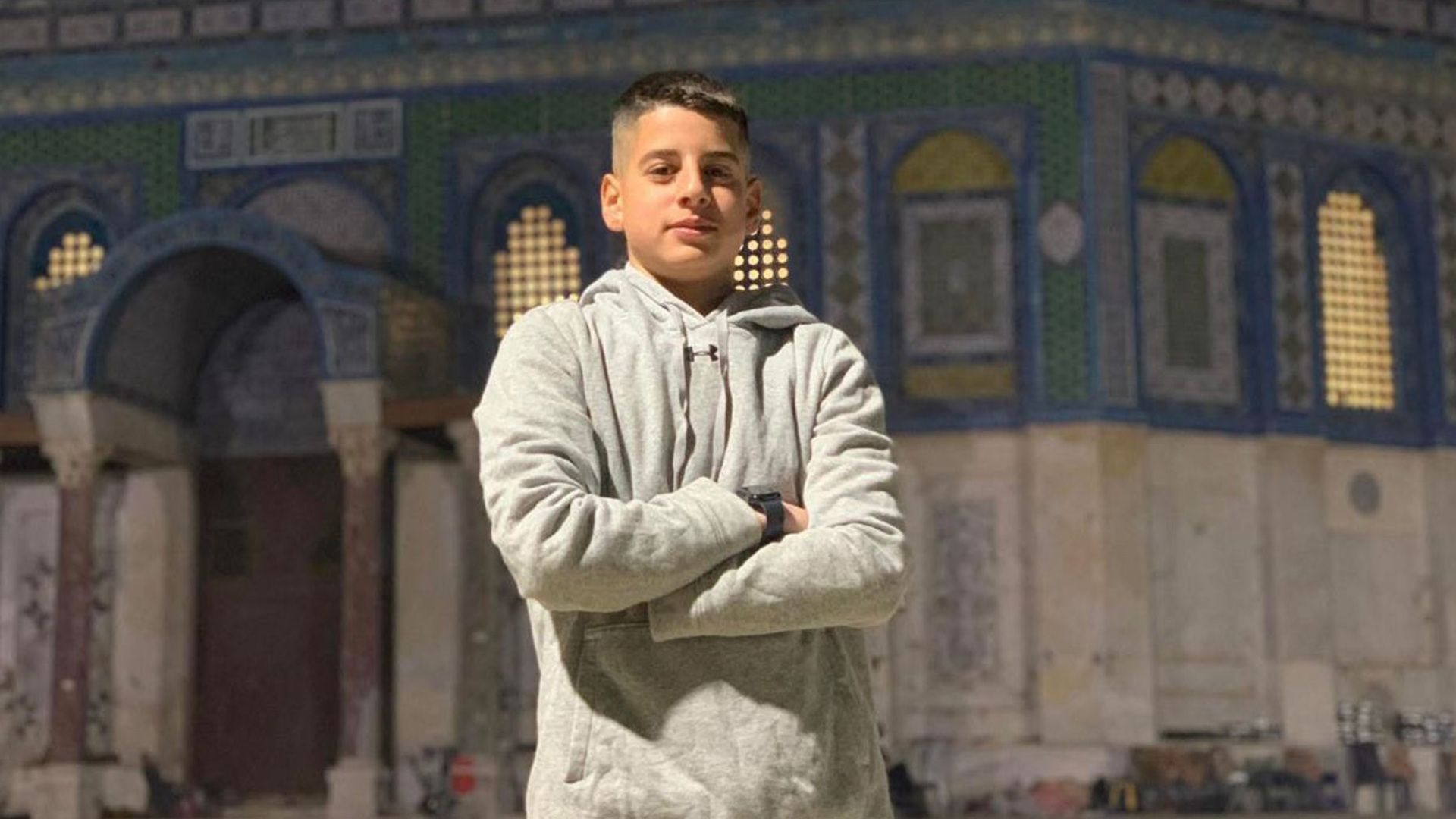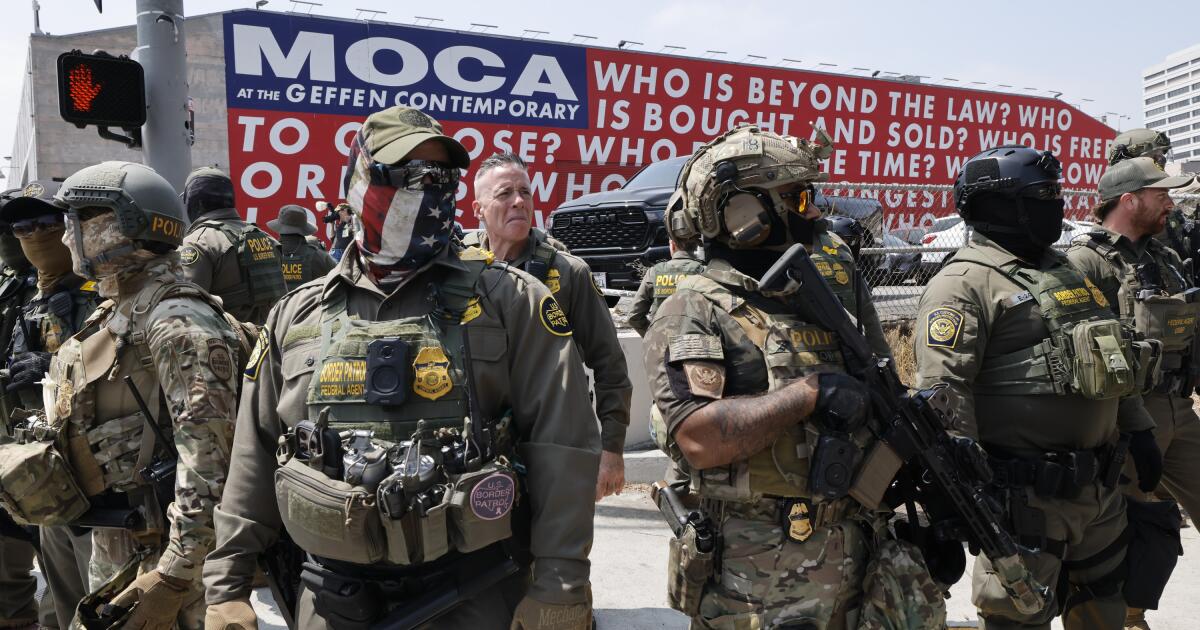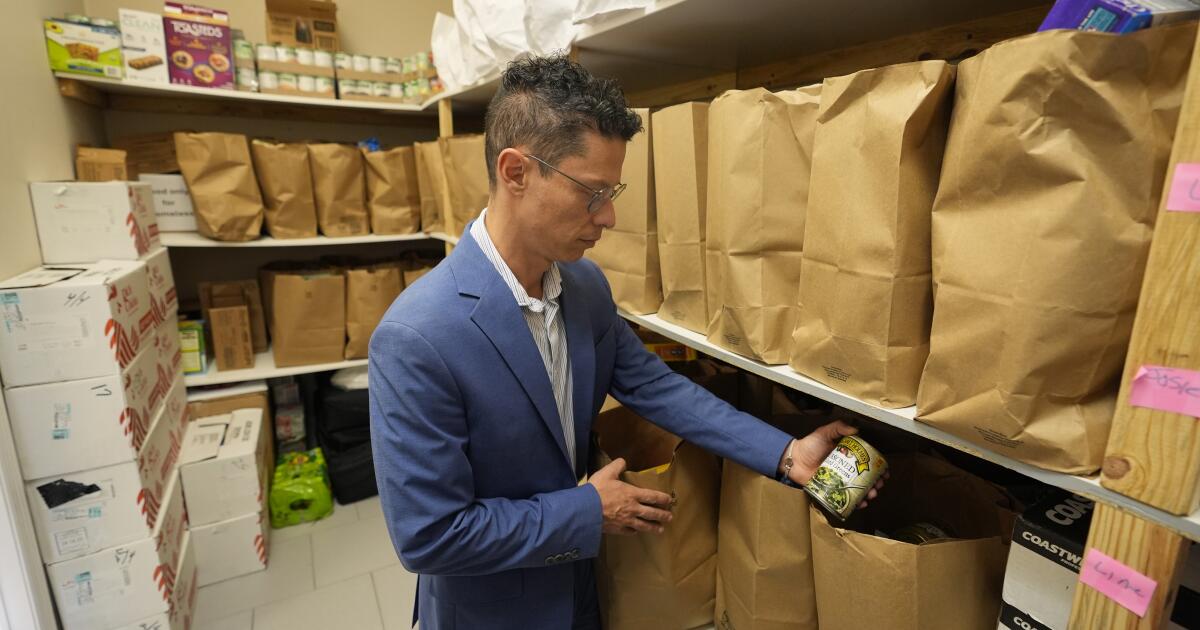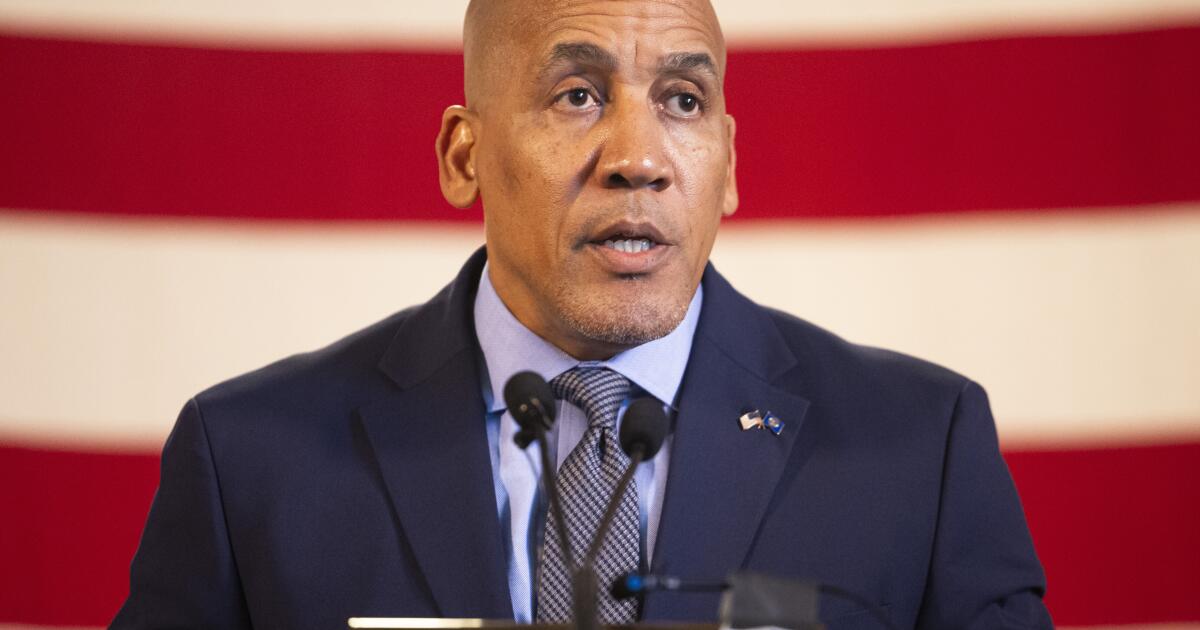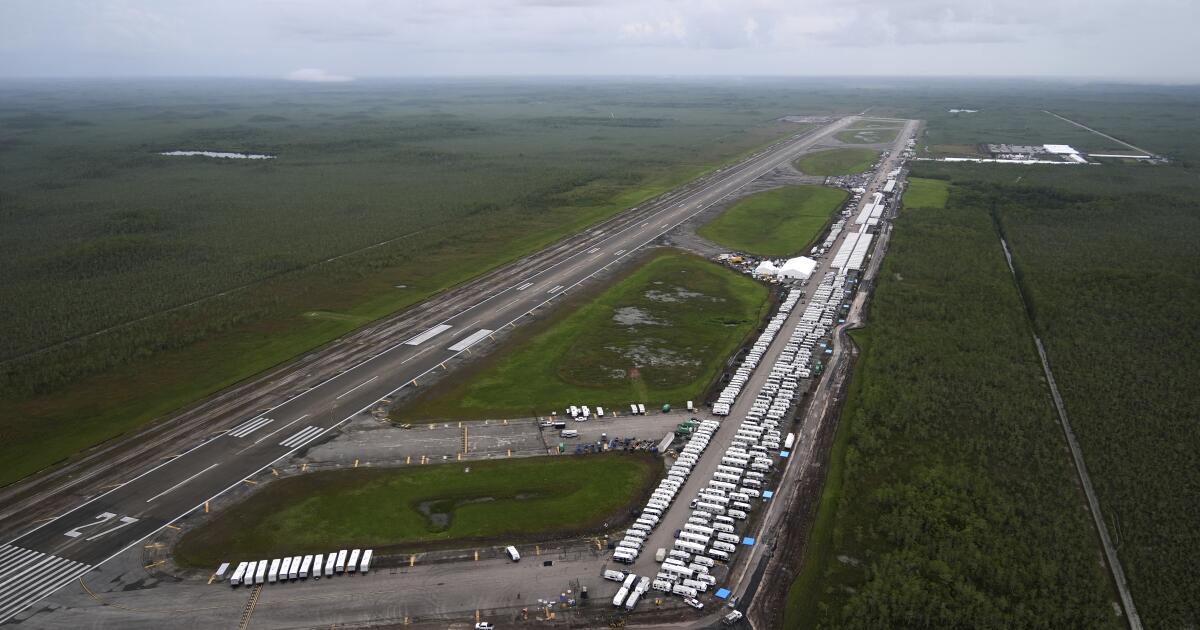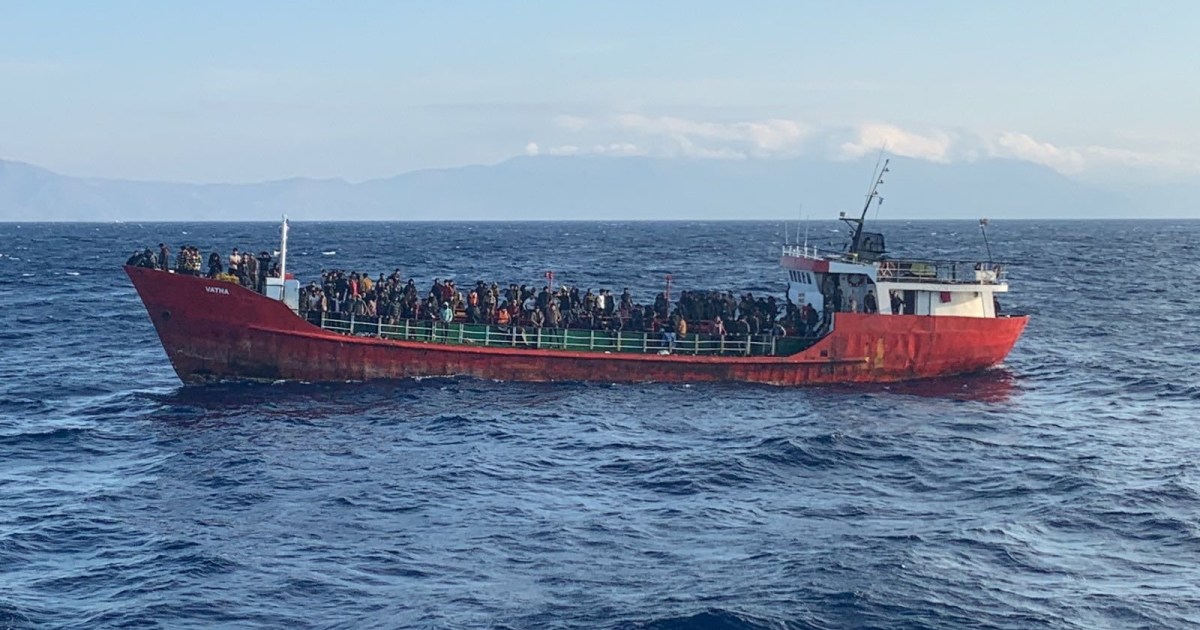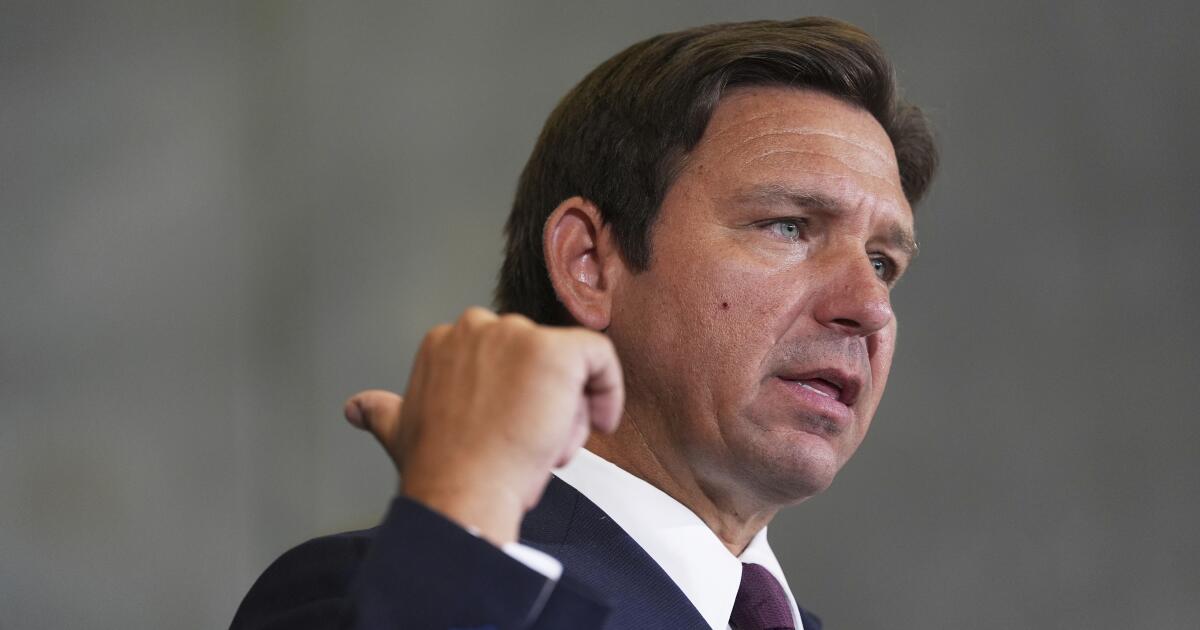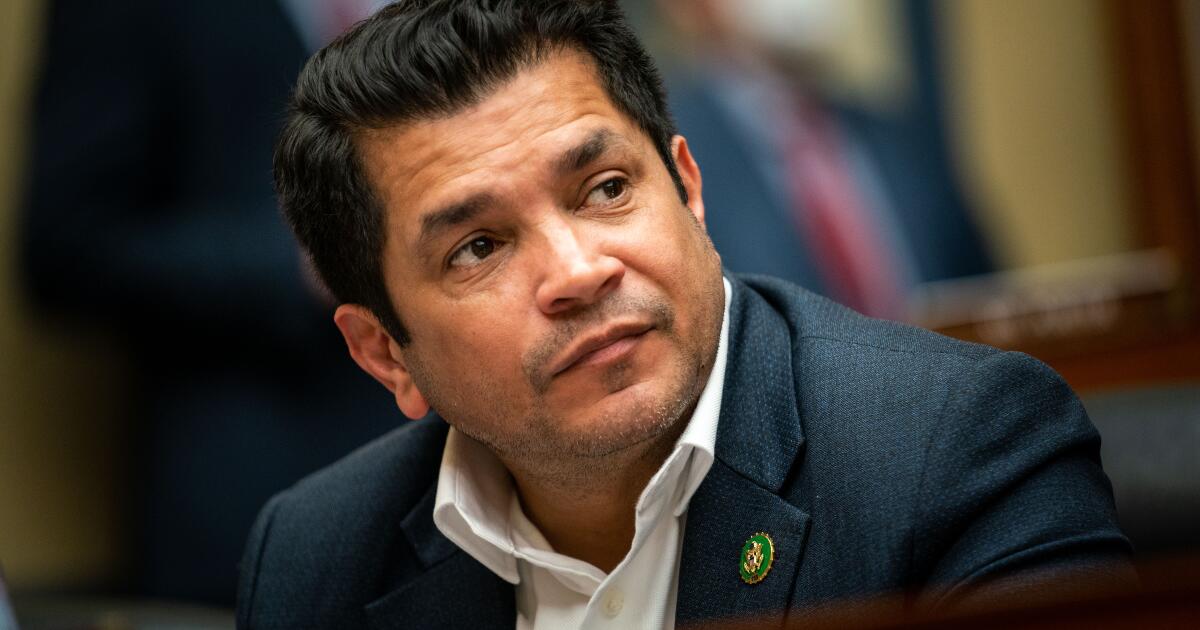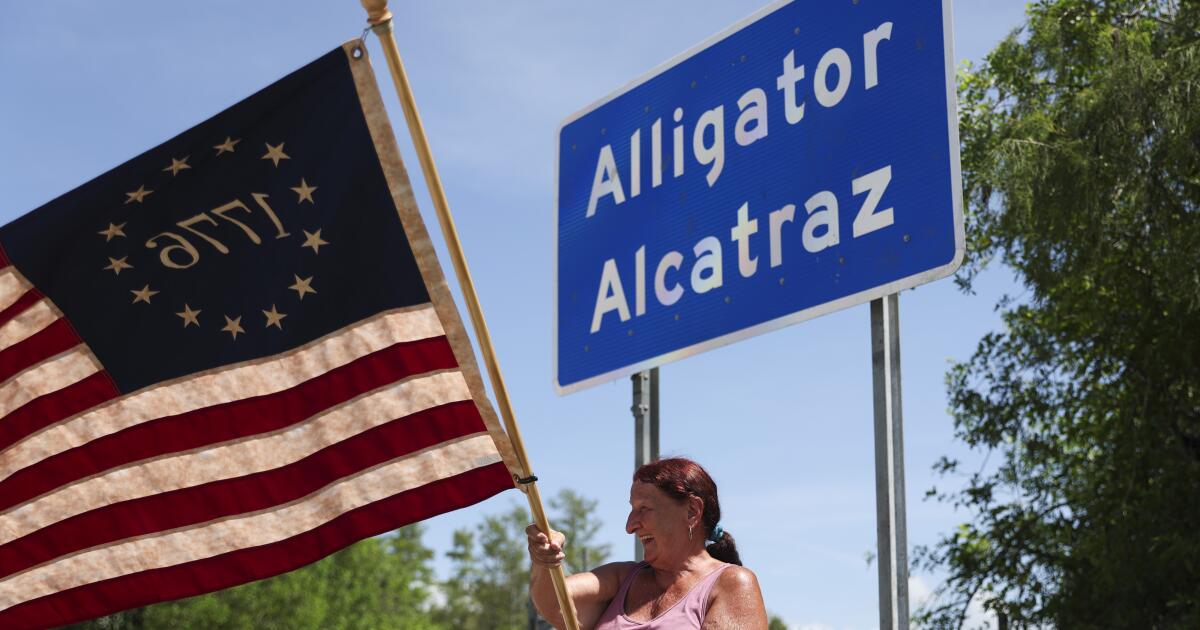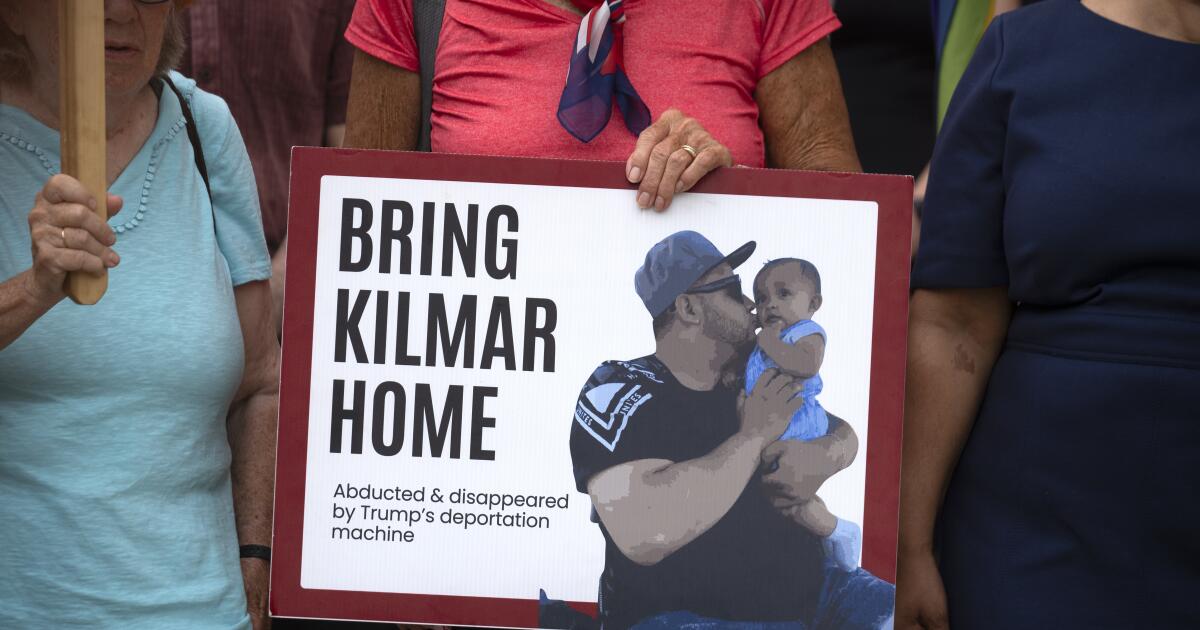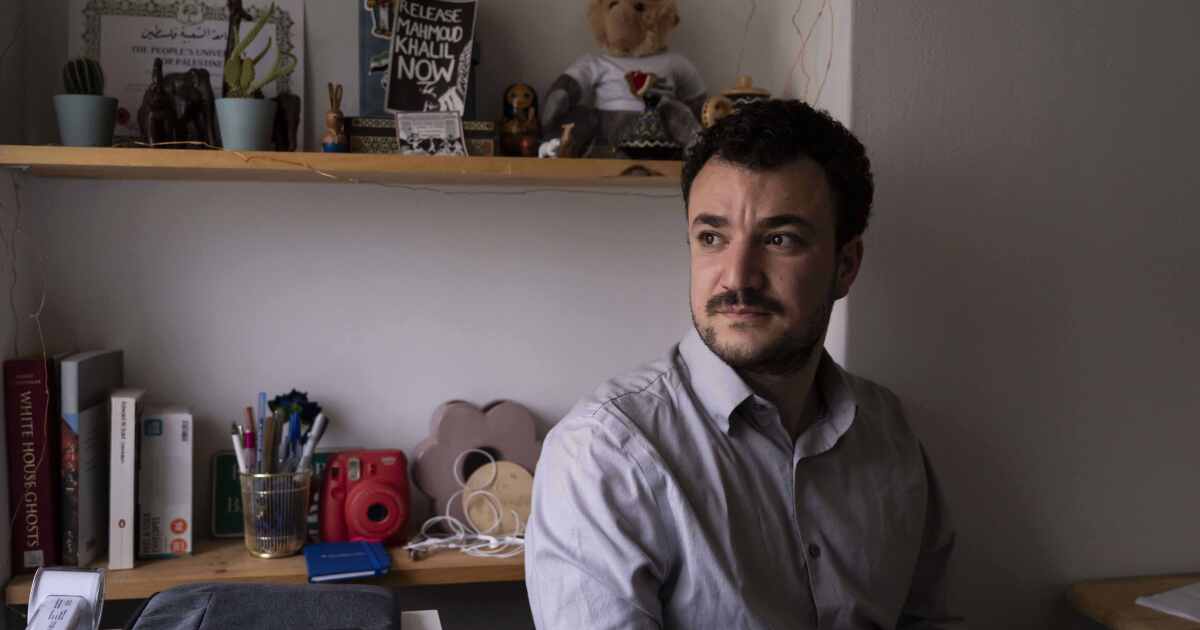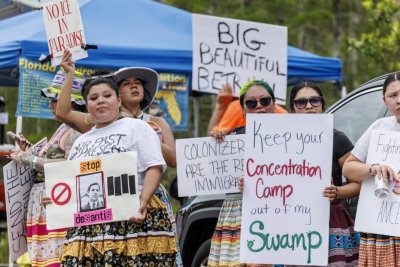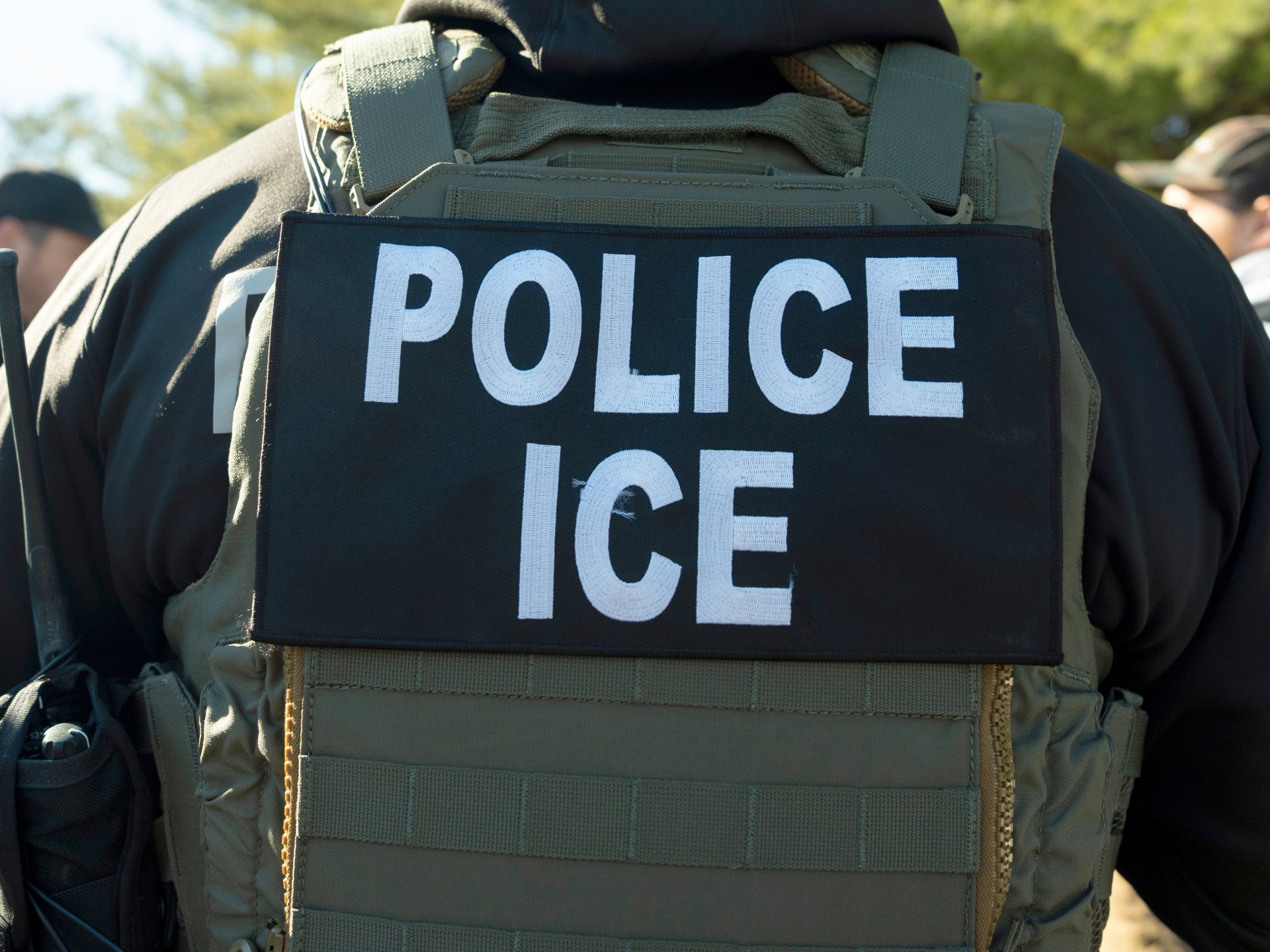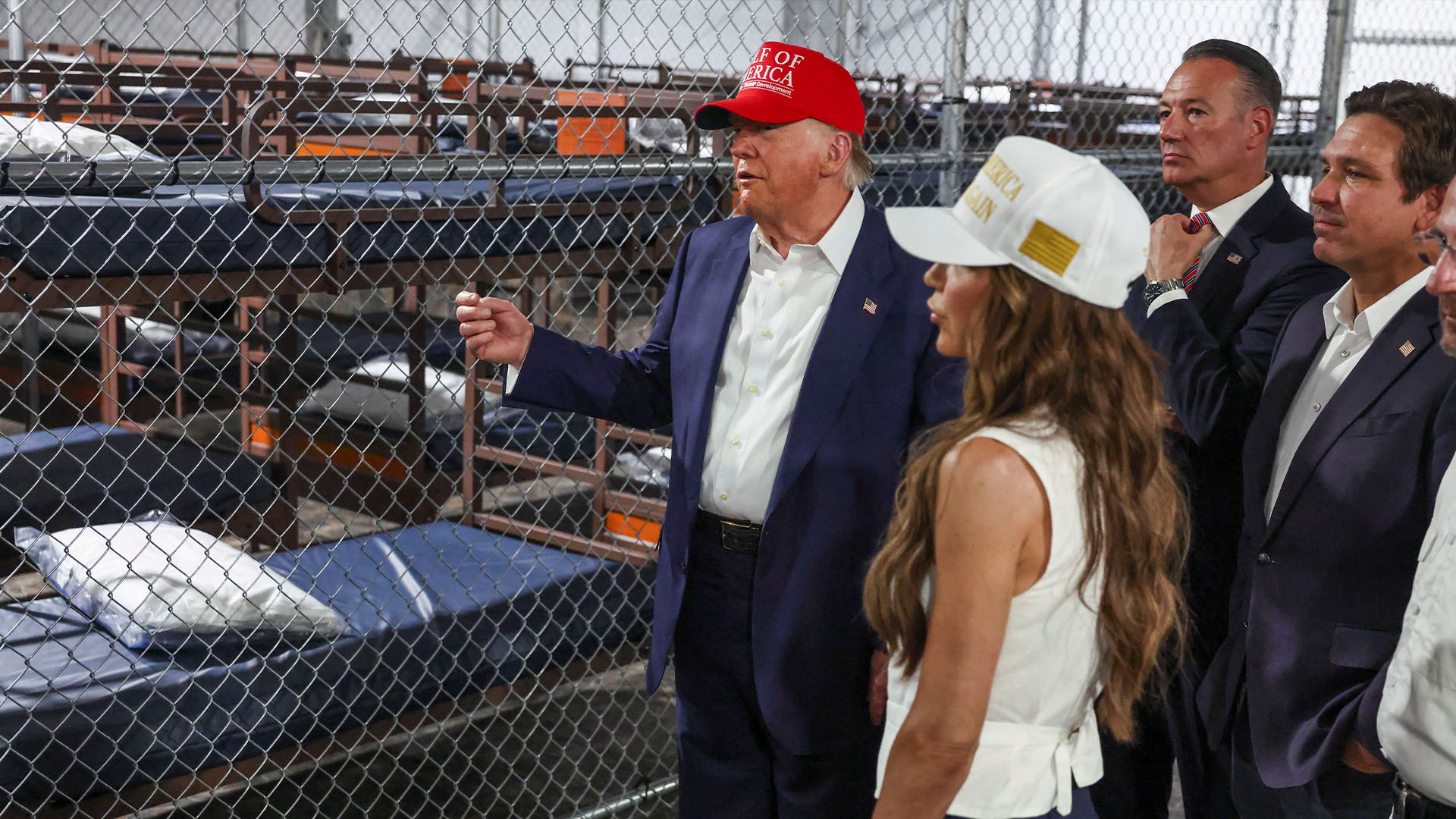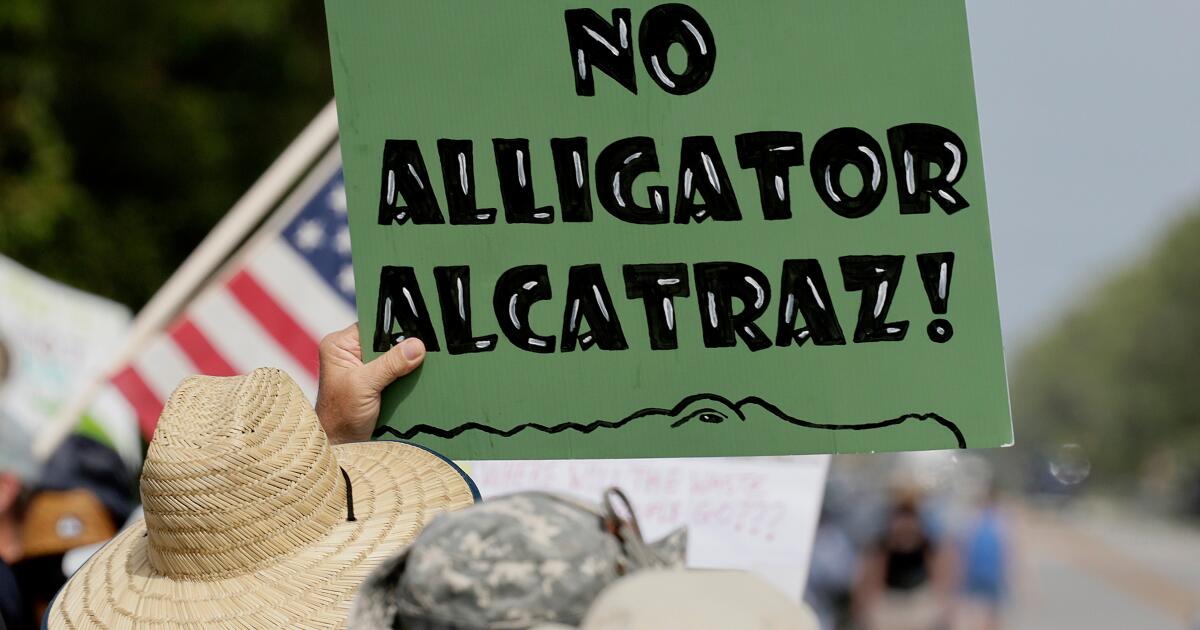Democratic members of Congress who saw Florida’s new immigration detention centre, Alligator Alcatraz, said they witnessed dozens of people in metal enclosures, bugs and mosquitos in bunk areas, indoor temperatures above 80 degrees and people screaming for help.
Republicans who also toured the facility tell a different story, describing the space as safe, clean and well-run. The federal Homeland Security Department, which oversees immigration detention, has called characterisations of inadequate conditions at the state-run Alligator Alcatraz “false”.
Homeland Secretary Kristi Noem was asked about Democrats’ accounts during a July 13 interview on NBC’s “Meet the Press”. She said the Florida-run facility is “held to the highest levels of what the federal government requires for detention facilities”.
“Our detention centres at the federal level are held to a higher standard than most local or state centres and even federal prisons,” Noem said. “The standards are extremely high.”
White House border tsar Tom Homan also touted the nation’s immigration detention standards as being a cut above those for prisons and jails.
When a reporter asked Homan about a 75-year-old Cuban man who had been living in the US for 60 years before he died in detention in Miami in June, Homan defended federal facilities.
“People die in ICE [Immigration and Customs Enforcement] custody,” he said, before saying ICE has “the highest detention standards in the industry. I’ll compare an ICE detention facility against any state prison against any federal facility. I’ll go head-to-head with any of them. … People say, ‘The detention centres are horrendous.’ Go look for yourself then come back and talk to me.”
Isidro Perez was the 11th person to die in ICE custody, almost six months into Trump’s second term. Twelve people died during former President Joe Biden’s last fiscal year in office.
ICE detention centres have standards akin to prisons. But it’s difficult to assess blanket statements about the standards of immigration detention compared with state, local or other federal facilities for a few reasons.
- ICE detention standards aren’t codified into law, so it’s difficult to enforce them.
- Different ICE detention centres are upheld to different standards based on the terms of their individual contracts.
- There isn’t one set of standards for local, state and federal prisons and jails. Some standards are mandatory or codified into law, others aren’t.
Several government watchdog agencies, advocacy organisations and news reports have long documented inadequate conditions at immigration detention centres.
In May, human rights group Amnesty International reported “physical abuse by guards, use of solitary confinement, unsanitary and overcrowded living spaces including dysfunctional toilets, inadequate medical care and poor-quality, expired food” at an El Paso detention centre.
Lauren Brinkley-Rubinstein, a Duke University associate professor who studies the health impacts of the criminal legal system, called Homan’s statement “very misleading”.
“In most respects, ICE facilities operate with less consistent oversight and legal accountability than state or federal prisons or local jails,” Brinkley-Rubinstein said. “ICE detention facilities and people that run them tend to be much less transparent about their operations.”
ICE has detention standards, but they aren’t set in law or universally applied
Several federal agencies and private companies run immigration detention facilities. ICE, the main agency tasked with immigration detention, has standards that all its detention centres are supposed to abide by.
For example, facilities have to be sanitary and have potable water. Detainees must have access to medical and mental healthcare, including getting prescription medications. Physical force should only be used when “necessary and reasonable” and not as a punishment. And detainees must be able to meet with their attorneys confidentially.
There are different sets of standards for facilities that hold immigrant detainees and other non-immigration-related detainees, such as local prisons, and for facilities that exclusively hold immigrants.
The standards for centres that also hold non-immigrant detainees “were based on jail standards in use by many jails”, University of Michigan law professor Margo Schlanger said, describing them as “the most stripped down version of jail standards”.
It’s unclear what standards Alligator Alcatraz is held to. The centre is state-run even though courts have repeatedly held that immigration enforcement is a federal responsibility. However, in a court declaration, Thomas P Giles, an ICE official, said the agency had toured the facility “to ensure compliance with ICE detention standards”.
Both sets of immigration standards are periodically updated, but there’s no timing coordination between ICE standards’ updates and other facilities’ updates. Standards are individually negotiated and implemented in separate contracts leading “to varying degrees of protection across detention facilities”, a 2021 Harvard Law Review article about immigration detention said.
Additionally, detention standards aren’t codified into law, making their enforcement difficult. Detainees’ complaints about the facilities’ conditions have little legal support to stand on because the industry is largely self-regulated, one immigration scholar argued.
“Standards are often merely guidelines and largely unenforceable. They are pliable and weak,” David Hernández, a professor at Mount Holyoke College who specialises in detention and deportation policy, said. “Very few facilities lose their contracts due to failing standards, or even deaths of detainees.”
Government watchdogs, nonprofit organisation, news reports detail inadequate conditions at detention centres
The Homeland Security Department is largely responsible for conducting inspections to ensure detention centres are meeting ICE’s standards. However, for years, government watchdog agencies and advocacy organisations have questioned the efficacy of these investigations, pointing to several instances of facilities not complying with ICE standards.
In 2020, Congress created the Office of the Immigration Detention Ombudsman to conduct unauthorised investigations of detention centres and to allow immigrants to file individual complaints for the office to review.
In March, the Trump administration tried to close the office. A civil rights group sued the administration. In response, DHS said in a declaration that the office would stay open but with a smaller staff. Immigration experts said this decision has severely limited oversight of detention centres.
News outlets and advocacy organisations have warned of inadequate immigration detention conditions, including overcrowding. The Trump administration is currently detaining about 60,000 people – that’s 20,000 more people than it has congressional funding to detain.
The external reports describe detainees in different locations being denied medical care, being placed in solitary confinement after complaining about conditions, not having access to legal resources and being targeted for being Venezuelan. Catholic University immigration law professor Stacy Brustin said these stories “mirror accounts” she and her students witnessed when visiting several detention centres.
“We heard shocking descriptions of overcrowding, sewage leaks, inoperable toilets, water running down cell block walls, insufficient access to water, spoiled or inedible food, inability to move freely in cell blocks for prolonged periods, and substandard medical care for individuals with serious, life-threatening conditions,” Brustin said. “All of these conditions violate ICE detention standards.”
For example, ICE standards say centres must provide detainees “a nutritionally balanced diet that is prepared and presented in a sanitary and hygienic”. Spoiled food is a violation.
Differences between ICE detention and prison standards
Some states have codified standards that their detention facilities are required to follow, others don’t. Some facilities are accredited by the American Correctional Association, which has its own set of standards.
All facilities have to comply with the US Constitution – particularly the 8th Amendment prohibiting “cruel and unusual punishments” in criminal cases and the 14th Amendment protecting people against deprivation of “life, liberty, or property, without due process of law”. Prisons and jails must also abide by federal laws related to sexual violence, inmates’ access to religious facilities, and people with disabilities.
“Courts have ruled that people who are incarcerated in these facilities have the right to care, safety, and humane treatment,” Brinkley-Rubinstein said.
Generally, prison and jail standards have similar provisions to the ones for immigration detention, such as access to healthcare and legal resources and having sanitary facilities.
Oversight practices also vary based on the facility. Some places are subject to independent oversight; others rely only on internal oversight.
The consequences for prisons and jails that don’t follow standards also vary.
“If the facility is under a consent decree and court supervision, the judge may require regular reports, appoint an independent monitor or a manager or even a receiver to operate all aspects of the facility,” said Andrea Armstrong, Loyola University New Orleans professor and prison conditions expert.
Some places may lose their contracts depending on the severity of the situation, Schlanger said. In other cases, facilities may face lawsuits.
Immigrants have more restrictions when trying to access courts to claim detention facilities are not upholding their standards. That’s because immigration detention is a civil rather than criminal form of detention.
That classification “creates a dangerous loophole where people can be held in carceral conditions without the constitutional protections that apply to those in the criminal legal system,” Brinkley-Rubinstein said.
